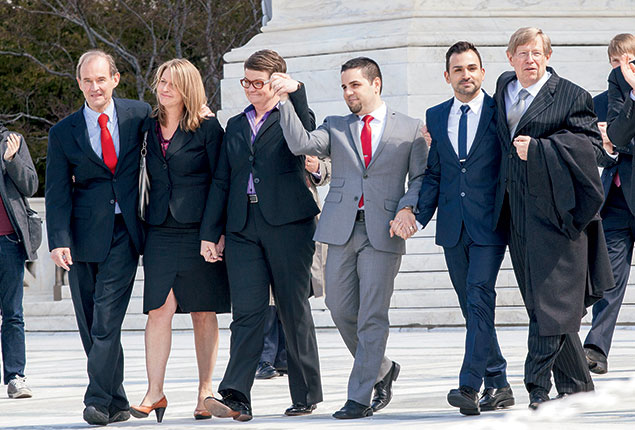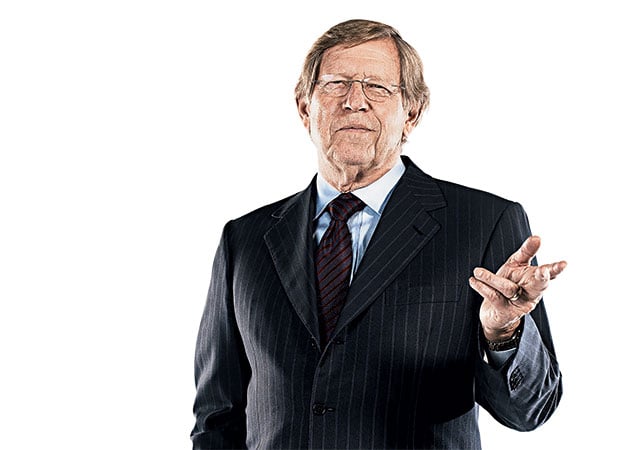Of all the stars to emerge from the Sundance Film Festival earlier this year, a 73-year-old conservative lawyer who helped win the 2000 election for President George W. Bush wasn’t the most obvious candidate to enthrall the industry bigwigs and film buffs holed up in Park City, Utah.
Nevertheless, the reception given to Gibson Dunn partner Ted Olson after screenings of The Case Against 8 was nothing short of ecstatic. Filmed over the course of five years by directors Ben Cotner and Ryan White, the documentary follows Olson and lawyer David Boies—his opposing counsel during Bush v. Gore—as they challenge Proposition 8, the California state constitutional amendment banning same-sex marriage.
In addition to the movie—which gets a theatrical release in Washington starting June 13 and airs on HBO June 23—Olson and Boies have published a book about the case titled Redeeming the Dream: The Case for Marriage Equality, out this month.
In his office in downtown DC, Olson discussed his ongoing challenge to Virginia’s laws banning same-sex marriage, his friendship with Boies, and how his involvement in the Prop 8 case flummoxed liberals and conservatives alike.
You said once that Perry v. Schwarzenegger [the case challenging Proposition 8] was the “most compelling, emotionally moving” case you’d ever been involved with. When you were approached about taking it on, what were your immediate feelings?
I grew up in California, and when I read that Proposition 8 was on the ballot, I was disappointed because it seemed to be inconsistent with the spirit of the state, with the independence and diversity of the frontier that California has always been. Then when it passed, I was even more disappointed. So when I was contacted, I had already thought about it and had even talked about it some.
I’d always felt from as far back as I can remember that where the issue of marriage is concerned, individuals should have the opportunity to marry and not be discriminated against. So when I was contacted, I thought that if we did it right—if we were very careful about how we put it together, if we found the right plaintiffs, the right resources, the right legal team, and all of those things—it was something I very much wanted to be involved in.
So there wasn’t a come-to-Jesus moment for you in terms of marriage equality—it was just something that you’d always believed in?
I’ve never felt that we should put gay and lesbian citizens into some kind of a box. I’ve been strongly opposed to racial discrimination and anything like that my whole life. Maybe it’s thanks to my parents and where I grew up and that sort of thing, but particularly with gay and lesbian citizens, I’ve seen that people can be cruel, and it’s very distressing.
One of the funnier scenes in the movie is when it shows how both sides respond to the news that you’re taking on the case. Chad Griffin, president of the Human Rights Campaign, says something like, “Ted Olson has been on the opposite side of everything I’ve ever stood for,” and Rush Limbaugh complains on the air that you’re at odds with the conservative movement. Did you feel the need to persuade people that you were serious about it?
Not so much the people on either side of the political spectrum, but I felt it was very important to convince Chad and to convince gay and lesbian organizations that I was very serious and that I wouldn’t have undertaken this unless I was committed to winning, and that I was committed to doing it the right way.
I also felt it was important to try to explain it to conservatives, so I wrote a 3,500-word piece for Newsweek—it was on the cover—about the conservative case for gay marriage, to try to explain why conservatives should be supportive of individuals coming together and getting married if they wish to do so.
Marriage is a conservative value: It means coming together, living in and being part of the fabric of a community and becoming a stable, committed unit. Those are conservative values, and I thought it was important to explain why people shouldn’t be surprised that conservatives would support them.
Why do you think conservatives tend to oppose gay marriage?
Some of it is religious—people have been brought up in very conservative environments in the Baptist or Mormon or Catholic church. Those were the big institutional opponents of gay marriage in California and the biggest proponents of Proposition 8. They all collectively raised a lot of money. So some of it is that, and some of it is a reaction to Supreme Court decisions that conservatives see as creating new rights in the Constitution. We argued, which you see in the movie, that this is not a new right.
Marriage isn’t new—it’s been around for a long time. People recognize that it’s an important institution. And this isn’t same-sex marriage; it’s marriage—just as marriage between persons of different races isn’t interracial marriage. It’s marriage. There’s some of this residual feeling out there that this is somehow a new right and that it’s threatening.
Also, I think that over time, and especially over the past 25 to 30 years, people have come to understand that gay and lesbian citizens are just like the rest of us. They come with a certain characteristic, and that is their sexual orientation, but otherwise they’re just like we are. The more gays and lesbians come out—the more people realize that they have a friend who’s gay, which they may not have known before, and they realize this person has the same aspirations and desires and need to be committed and to be part of a community—then they become more accepting. So that’s why the trend lines have been so dramatic in terms of societal acceptance.

There are three fascinating same-sex partnerships in the movie: the two sets of plaintiffs, obviously, and then you and David Boies. That partnership is really interesting to observe. He’s obviously a very good friend of yours. What was it like to work with him?
We had been on opposite sides, of course, and after the Bush v. Gore experience, various events brought us together and we became more and more close as friends. Our wives are both talented, engaging, exciting individuals and lawyers, and we get along, we like to do the same kinds of things. We’d talked about wanting to work together. This was the first big opportunity to do that. We’ve worked together quite a bit since then on some cases, and we’re working on a couple right now. He’s fantastic. He’s a brilliant lawyer and a lovely, lovely man. A great human being. He’s got a wonderful sense of humor, and he’s just a very exciting person to work with.
Can you tell me a little bit about the case you’re arguing in Virginia?
It raises all of the same issues except that Virginia’s statute and constitutional provisions are even more restrictive. They prohibit domestic partnerships, civil unions, or any relationship that’s anything like that. The laws declare that relationships between people of the same sex that are similar in characteristics to marriage are void, which would nullify relationships that people formed in other states. It’s really a quite awful set of laws, and we hope we’ll be able to convince the Fourth Circuit.
What happens after that?
If we’re successful, I suspect that the other side will want to take it to the Supreme Court.
Given that the justices have ruled favorably in cases about same-sex marriage before, is it possible to predict that they’d do the same again?
I don’t like to predict what the United States Supreme Court will do, but David and I say together that we feel so strongly about the arguments that we feel we will be able to persuade the Supreme Court that this is the right outcome. It’s time to put this issue to rest and to resolve these cases that are taking place all over the United States. We feel pretty good about our chances of succeeding, but beyond that, we don’t like to predict what that court [he points out the window] is going to do.
What was it like having the filmmakers around as you were preparing the case?
They were good about not being too intrusive. We allowed them into the preparation sessions, which you can see in the film. But also whenever we were discussing anything that was highly confidential or very delicate, they were gracious about it. They did their work very unobtrusively and were always courteous about saying, “Can we have a few minutes?”
How do you feel about the movie and how it’s been received?
It’s wonderful. I’ve seen it two or three times, and it’s still overwhelming. It’s been very successful at Sundance and South by Southwest and other festivals. I didn’t anticipate it. I knew the guys who were making it were very conscientious, and they were taking a lot of time and they had a lot of access, but I don’t know anything about documentaries. Once I heard that HBO wanted it and was putting one of their top editors, or their top editor, on it, I thought it was going to be very good. But this was beyond any of our expectations.
Were you surprised by how people have responded to you personally after seeing the movie? You were something of a rock star at Sundance.
I don’t think of myself in quite that way. I’m very gratified by people who tell me that what we’ve done has contributed to an improvement in legal and societal relationships and respect for gay and lesbian people. To the extent that we’ve done something to help that—and when people say we’ve had something to do with affecting their lives in a good way—it’s very gratifying and inspiring.
This article appears in the June 2014 issue of Washingtonian.



















